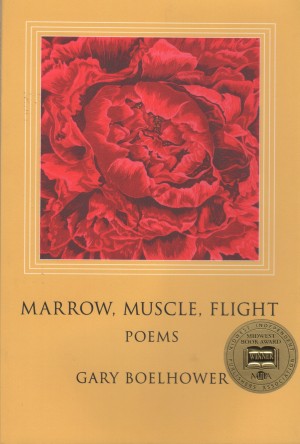
Marrow, Muscle, Flight by Gary Boelhower (2011. Wildwood River Press. ISBN 9780984377749)
Disclosure: I have written poetry, mostly as an adjunct to courting my wife 37-plus years ago, but I am not a poet and know little, if anything, about the niceties of constructing verse or prose poems. As a novelist, book reviewer, and essayist, I tend to read fiction and disregard poetry. But lately, I’ve been intrigued by the patterns and lyrical quality of poems and so, I’ve been reading a few slim volumes of verse acquired from local writers. Marrow, Muscle, Flight is one of those collections. I bought the book at a recent arts and crafts fair held at Peace Church in Duluth where the book’s author and I were selling our wares. It took a while for me to retrieve the book from my reading stack but I’m glad that I did.
Boelhower is a tremendously gifted storyteller. His poems run the gamut from detailing his youth and family, to personal relationships, to his son’s military service. The author is at his best when he doesn’t hold his punches, as in this terrific bit of writing:
Neither the father nor the son asks
the question that burns behind their eyes.
What do you do after you fight a war,
pull the trigger, see the blood run, feel
bits of shrapnel bite into your face a fraction
from your eyes, tighten a tourniquet around
your dying friend’s stumps of legs?
(“Asking the Question” (c) Gary Boelhower)
I’ll be candid. It’s not easy for a heterosexual male (me) to dive into love poems reflecting homosexual love ( there are some in this collection). I’m pretty outspoken about my support for gay marriage and equality regardless of orientation, but, like straight women who feel uncomfortable with cinematic depictions of lesbian coupling, I have to admit I began reading the poet’s revelations of physical love between two men with some trepidation. But part-way through this collection, it hit me: Love is love. Gender, in the expression of the emotion, doesn’t matter. Content and heart do. Boelhower captures these truths with a keen eye and pen:
did you know then
how the river would carry us
how the light would fall
on the pink peonies in the garden
how we would drink wine on the deck
and watch their satin gowns
tremor in the breeze
(“Did You Know” (c) Gary Boelhower)
Now, I’m not sure that the above passage directly reflects the poet’s orientation. I have no idea if the poem depicts a same-sex or opposite-sex scene from the author’s life. But that’s just the point: Boelhower crafts his words into universally fine pieces of art that stand up to scrutiny as works of poetry, not political commentary. Even old fiction writers like me need to learn a lesson or two about the lives led by our friends, family, and neighbors who have a different outlook, a different experience, than our own. This fine collection is a gentle and consistently astute teacher in this regard, using subtle situational narratives to invoke universal emotions and reactions from a reader’s basic humanity.
4 and 1/2 stars out of 5.



Boelhower speaks with an open passionate heart about life in all it’s complexity of war, suffering, love,
and questions our ability to learn and live more authentically.
Thanks for commenting! Yes, a fine collection by a fine poet.
Mark